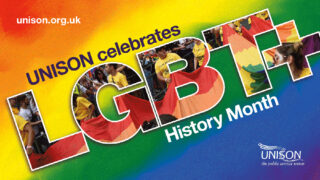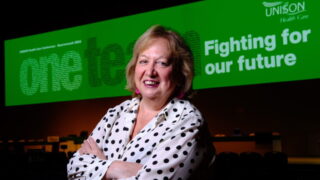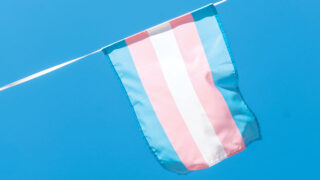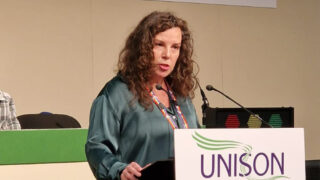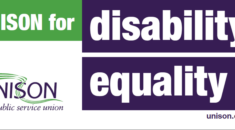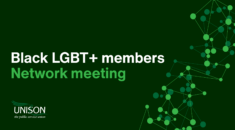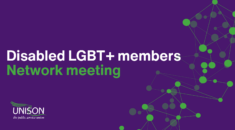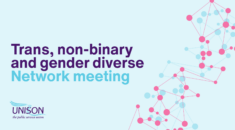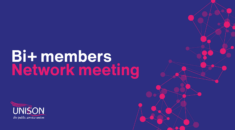February is LGBT+ History Month – and 2024 is UNISON’s Year of LGBT+ Workers – so what better time to take a few minutes to consider how UNISON has been making history in the fight for LGBT+ equality?
Decriminalisation of homosexuality in England and Wales finally occurred in 1967, while lesbianism had never been illegal. In 1976 NALGO, one of UNISON’s founding unions, was urging negotiators to seek to add sexual orientation to non-discrimination clauses in all collective agreements.
In 1981, NUPE member Susan Shell was sacked from her job as a residential care assistant for being a lesbian. While she had the support of her union, the law offered no protection at the time.
Ms Shell’s situation – and the lack of protection – saw NUPE affiliate to the Labour Campaign for Lesbian and Gay Rights, becoming the first trade union to do so.
Also in 1981, decriminalisation finally arrived in Scotland and, 12 months later, in Northern Ireland.
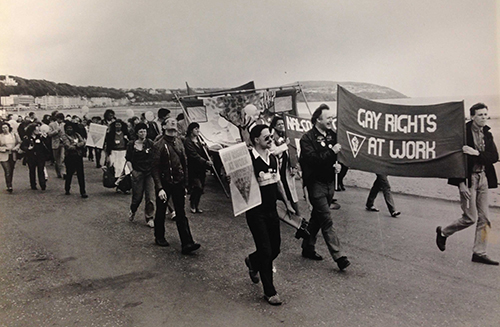
Marching on the Isle of Man
Fast forward to 1983 and NALGO’s annual conference in Douglas, on the Isle of Man. On the island, a British Crown dependency, homosexuality was still a criminal offence. At the conference, many delegates wore stickers saying: ‘Glad to be gay in Douglas’ and ‘Gay OK’ and, on the Thursday, some 300 delegates marched along the promenade and through the main shopping centre to deliver a petition to the government building, calling for gay rights.
The Isle of Man finally caught up with the march of progress in 1991.
In the meantime, in 1985, the Labour Party conference included a vote on whether to include lesbian and gay rights in its manifesto. Campaigners were on edge, but they knew that, as well as the support of the National Union of Mineworkers – in the wake of the events during the miners’ strike that are portrayed in the film Pride – their only other guaranteed support would come from NALGO and NUPE.
The vote passed and campaigning moved to the next stage.
COHSE joins the struggle
In 1987, COHSE joined the fight, passing a resolution at its conference to support equal opportunities for gay men and lesbians “at work and in the trade union and labour movement”.
UNISON’s constituent unions continued working around lesbian and gay equality throughout the 1980s – not least against Clause 28 of the Local Government Act, which is also known as Section 28.
It was finally repealed in Scotland in 2000, in England and Wales in 2003 and in the Isle of Man in 2006 (it never applied in Northern Ireland). No case had ever been brought under the legislation, but it caused a climate of censorship, confusion and fear, a loss of funding and support to organisations, and contributed to the struggles of lesbian and gay people.
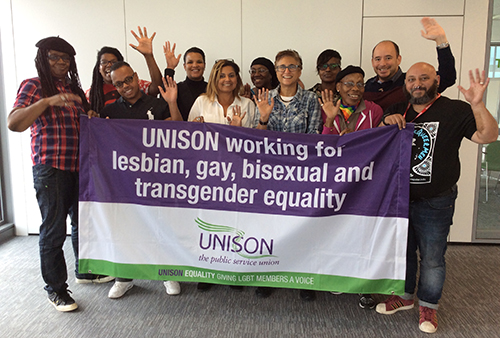
Inclusivity is our name
In 1990, The Voice newspaper published a series of articles, attacking and ridiculing Black lesbians and gay men.
Activists from NALGO formed Black Lesbians and Gay Men against Media Homophobia and, with the union’s help, launched a successful campaign to persuade public service employers not to advertise jobs in the paper.
The boycott was lifted when the paper’s directors met with campaigners and NALGO reps, and agreed to a full-page right of reply, improved representation for Black lesbians and gay men and a comprehensive equalities policy for its own staff.
Making more history
In 1991 NALGO elected Mike Blick as president – the first openly LGBT+ trade union leader in the UK.
In 2005, eight years after COHSE, NALGO and NUPE had founded UNISON, the union took the historic vote that created the LGBT group, including bisexual and transgender members in our self-organisation. In the same year, the union was recognised as bi-inclusive by BiCon, the UK’s national conference for bisexual people.
But nobody has been resting on their laurels.

Cover star Phillippa Scrafton
In 2013, Phillippa Scrafton was elected as the national LGBT committee’s first out trans chairperson (two years later, she was the cover star of U magazine, which went out to every one of the union’s then 1.3 million members) and Maureen Le Marinel became the union’s first out gay president.
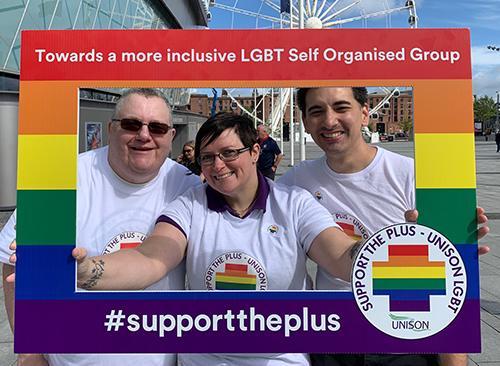
Adding the ‘plus’
And let’s not forget 2019, when activists won unanimous support at national delegate conference to change the group’s name to LGBT+, making us even more inclusive.
Since then, our successful trans equality campaign has seen over 3,000 UNISON members trained to be a good trans ally, while over 30 workplaces have adopted the union’s trans equality model policy.
The work goes on – providing support for LGBT+ members across the union.
Resources and further reading
Everyone who is not themselves trans can be a ‘trans ally.’ And UNISON has produced guidance to help you do that – and you can find it here.
You can find a checklist here of workplace policies for LGBT+ inclusion.
If you’re interested in reading more, Peter Purton’s Champions of Equality: Trade unions and LGBT rights in Britain, looks at the wider union work on LGBT+ rights, but of course the book includes UNISON – with mentions for both then UNISON national officer Carola Towle, and also Phillippa Scrafton. It’s published by Lawrence & Wishart.
For more about the role of LGBT+ activists in the miners’ strike, not only is there the film Pride, but also the book, Pride: The unlikely story of the unsung heroes of the miners’ strike, by Tim Tate, with LGSM (Lesbians and Gays Support the Miners), published by John Blake.
Paul Baker has penned an excellent, really accessible history, The story of Section 28 and Britain’s battle for LGBT education, which not only illustrates the impact of the legislation, but also the rhetoric used in media and by politicians about LGBT+ people. It’s published by Reaktion Books.
• This article was originally published in February 2020, but has been updated and amended for February 2024.




